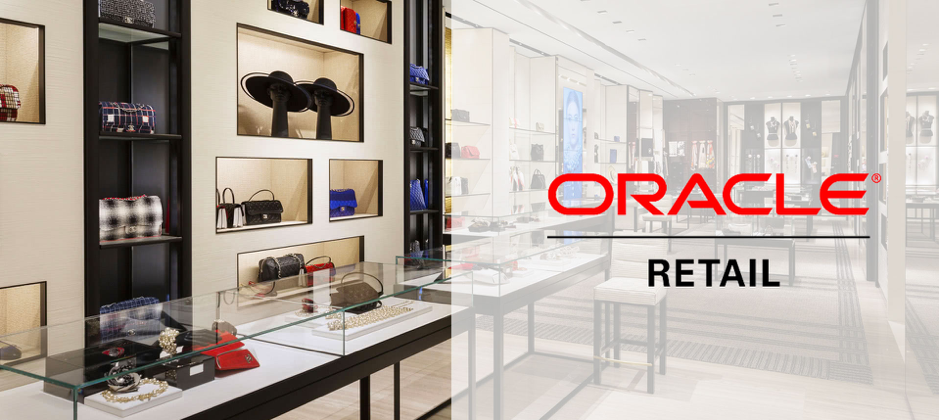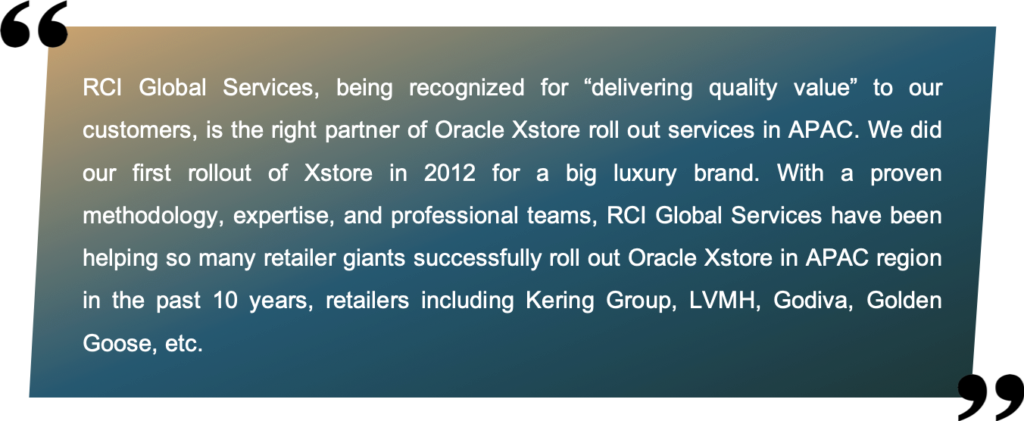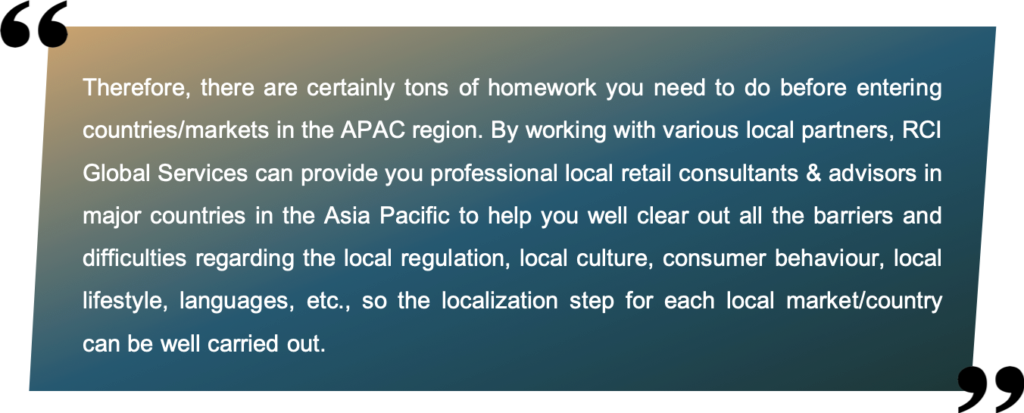
Oracle Xstore POS is famous for its robust point-of-service functionality and platform enables retail staff to deliver on the brand promise in store with inventory visibility, omnichannel, customer intelligence, and seamless transactions.
At this moment, we believe that Oracle Xstore POS is one of the best and trendy POS system in the world, being widely applied by various retailer giants (Kering, LVMH, etc.) not just because of its incredible accessibility and easy-to-use, but also because of its solid functionality that will truly improve your overall workflow and efficiency.
Perhaps, your company is one of those visionaries, already using Oracle Xstore POS to operate your retail business in certain markets such as Europe, US, etc., and now is planning to deploy this powerful solution to your business in Asia Pacific region.
However, based on our years-experiences, rolling out the Oracle Xstore POS in the Asia Pacific can be a totally different story. There will be so many unexpected challenges that could possibly be the factors to jeopardize your whole rollout project if you just rush into the APAC region without any preparation.
But don’t worry, we’re here to help by summarizing 5 GLODEN RULES to smoothly roll out Oracle Xstore POS in APAC, which we believe can give you an insightful picture of carrying out a system rollout in Asia Pacific region.
1. Select the right partner

Asia Pacific region is super diversified. There is no such common “Asian” culture or approach to business but many widely different cultures with long histories. So when you’re talking about rolling out a system in multiple APAC countries, you can imagine how strong the cultural interaction is going to be created, which is definitely a complicated thing to be handled.
In such a special region as APAC, it’s very important to select the right partner smartly because we’ve seen so many failure cases in the past caused by the terrible partner-selection methods.
If you’re going to roll out a system in just one country in APAC, you can skip this part because finding a local vendor in each country is easy.
But now we are talking about a large-scale rollout project, which means it could involve in several, or even more than 5 countries or in some strategic countries for your business. In this case, we certainly don’t think that selecting multiple local partners is a good idea because, from our experiences, that will create so many inconsistent issues and management problems regarding the timeline, the people, the training, etc.
Therefore, working with 1 single partner that can simultaneously handle different countries’ system rollout project is a better option, which means the partner should have solid cultural knowledge of different countries in APAC, possess a professional team consisted of diversified Asia backgrounds, and strong experience in helping other retailers successfully carry out system rollout projects.

2. Define Right team organization

Building up a quality system rollout team is not only requiring a professional central team to macroscopically manage the overall rollout project, but also requiring solid local partners in each country to deal with various specific local issues.
To identify the right team organization, there are some certain aspects you should consider.
Experience aspect
Possessing rich rollout experience could be a guarantee. Just go find out if the team’s experience of delivering rollout services is similar to the one you plan to look for and then evaluate it by standards, such as the number of projects they successfully executed, the types of clients they served, the types of system rollout they executed, and the expertise for knowledge-intensive tasks.
Communication aspect
The level of communication can be the key to make, or break, a project’s success. The language barrier is one of the major and critical issues for the project since, in some countries of APAC (ex. China, Japan, Korea, etc.), English is not the primary language for the communication. How well do the team members interacting with each other and how well do the team understand your requirements are playing a critical role in the outcome of the rollout project. It’s also important to know the team’s language capability and adaptability to different Asian cultures.
Methodology aspect
For the APAC region, there are two common rollout approaches, “Caravane” and “Parallel”. Both approaches have their own strengths and weaknesses, so it’s important for a team to understand these two approaches comprehensively, being able to select the most optimized methodology for the system rollout.
Parallel rollout is for large-scale system migration to your organization that’s rolled out all at once and immediately get rid of the old system, eliminating the issues that can appear when users are working with different systems, and avoiding to maintaining 2 different POS systems during the transition phase. The Parallel approach can be applied for multi-stores in the same country or for different countries in the same time.
Caravane rollout is another way for large-scale system migration. But, unlike the Parallel, it requires to divide the big country into several small regions/cities first and then roll out the new system area by area. Caravane rollout approach involves using the existing and new systems simultaneously. During the transition, you need to work with both systems as you gradually learn the new one.

3. Localization for each country

We’ve mentioned before that every country in APAC has its own unique culture so it’s absolutely unwise to implement a universal solution, which makes the localization capacity one of the most critical considerations for retail business in APAC.
Oracle Xstore undeniably is an excellent product, but still, it’s got its weakness which is the toughness of configuration and customization. If you don’t carefully localize your Xstore POS system based on the specific business environment, you’re going to get a lot of trouble.
Take the language aspect as an example. The original Oracle Xstore POS only support those common languages, such as English Simplified Chinese, etc. But you have to know that there are more than 23 countries using 14 different languages in the Asia Pacific region and most languages there are totally unique, like Korean, Japanese, Thai, etc. In this case, professional language customization becomes so important for the user experience of the new system.
Another example is about local regulations. Each country has its own regulations for doing business locally. Let’s say the tax-free policy in Hong Kong, the unique invoice rules and Cyber Privacy Law for customers data in China, the acts for personal information identification in Korea, etc. Besides, different country has different requirements regarding the acceptance of multi-currency, terms & conditions draft, tax and receipt, etc.

4. Hardware delivery lead time

Another important rule you should know when you’re doing Oracle Xstore POS rollout in APAC is that the Xstore, in most of the time, is not compatible with all hardware in the market. You can’t just use your existing hardware, or randomly purchase a set of hardware, and expect it’s able to run the Xstore smoothly.
Hardware preparation and planning are also a crucial step for a successful Xstore POS rollout, so you should pay attention to it. Based on our experience, various detail aspects should be considered during the purchasing.
For example, sometimes it would be better to purchase certain hardware locally, such as the keyboard in the local language, to benefit of the guarantee if it’s a failure, which can save you lots of trouble in the future.
Some hardware can be very expensive and required a very long lead-time be delivered, such as HP-RP9 POS, Epson receipt printer, Zebra Printer, etc. So you should put both delivery time and price into consideration when you’re looking for the right hardware.
Also, carefully read the delivery policy in each country can help you avoid big troubles. For example, in some countries like Philippines, Thailand, and Taiwan, you have no choice but purchase certain hardware locally because of the local delivery regulation which doesn’t allow you to ship certain hardware from countries like Hong Kong and Europe.
Besides, even though you’ve got all the right hardware, Oracle Xstore installation and setup can be complicated. There are lots of unpredictable challenges regarding the compatibility adjustment between hardware and software during the progress, so face-to-face communication with store staff for timely solving problems is necessary and we definitely don’t recommend you to do the Xstore installation remotely.

5. Ongoing support

Even if the system is finely operating after the installation, you can’t guarantee that there won’t be any issues later on. If there is any challenge to come after the Post-Go-Live such as the usage problems, system upgrade, service desk requests that need IT involvement, etc., we’re sure you will expect a timely professional help which is called the “Level 1 support”.
We believe that the most optimized support form in APAC situation should, at least, include the following core points.
Regional support
Compared with local support, directly using regional support can greatly simplify the overall support management and avoid any confusion when they’re looking for help from the support team. One line, one center, and one team for multiple countries / markets in APAC.
Communication capability
For solving all problems from different countries in APAC, the support team should be able to provide support in different languages based on the specific situation. Also, the availability of multiple types of communication channels should be included. (ex. “WeChat” in China, “Line” in Thailand, “Kakaotalk” in Korea)
Located in the Asia Pacific area
The support center located in the APAC area can be so helpful if there is any urgent situation that requires face-to-face communication. Even though the regular support communication is mainly made through the phone call, you still can’t be 100% relieved if the support team is located far away like Europe and North America. Also, being located in APAC area can remove the time zone difference with other regions.
Solid experience in the retail industry
Only the support service providers truly understand the retail industry, they can recognize which the priority level of each issue when they’re dealing with the support cases, which can definitely make the overall support workflow smoother and more efficient.

About RCI Global Services

RCI is a global leader in Retail professional services and Omnichannel experts. Within consulting and professional services, RCI works with large enterprises on their Retail Management System, POS, CRM, OMS, e-commerce, mobile payment solutions, and operational challenges. Consulting and Expertise helps clients protect their businesses, improve performance and enable change. We are recognized for “delivering quality value” to our clients in different service areas and have extensive experience in providing these services.
Within the Asia Pacific Area, RCI is one of the fastest-growing professional services organizations, specialized in Retail Technology and Omnichannel. At RCI, we are committed to building a better working world – with increased trust and confidence in business, sustainable growth, development of talent in all its forms, and greater collaboration.
All trademarks and trade names mentioned herein are the properties of their respective holders and hereby acknowledged.
Contact: RCI Global Services
contact@rciapac.com
+852 2351-0371
